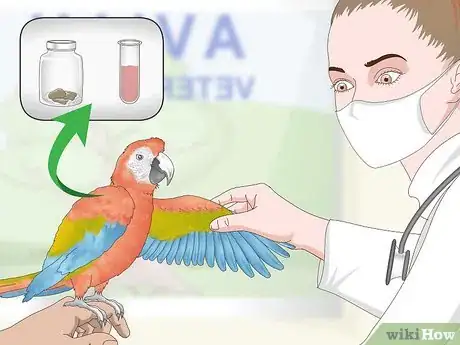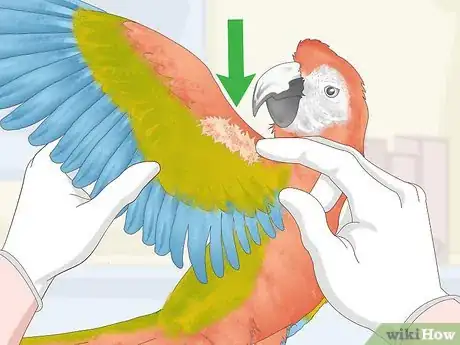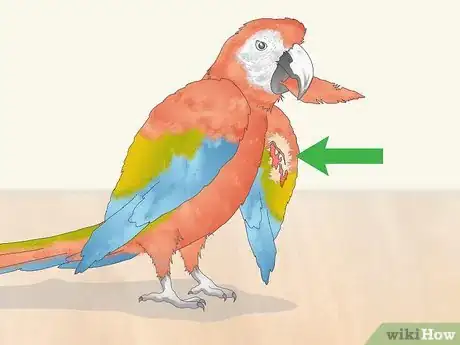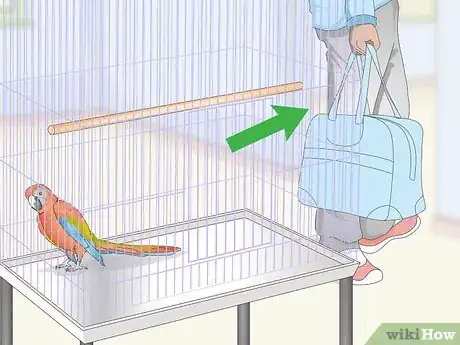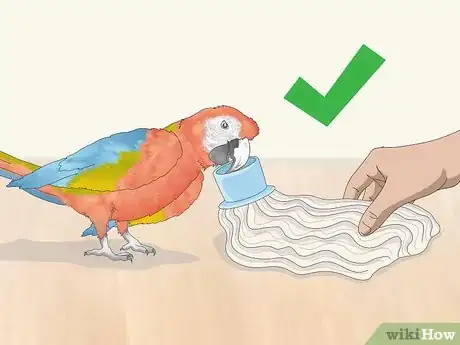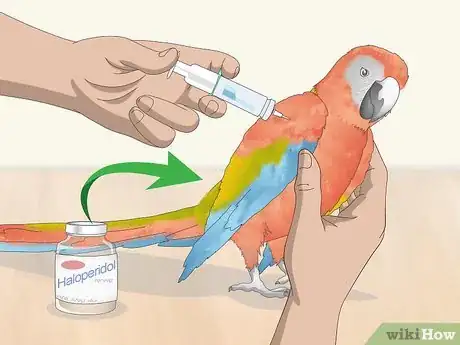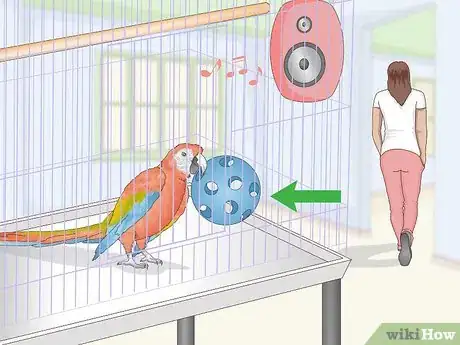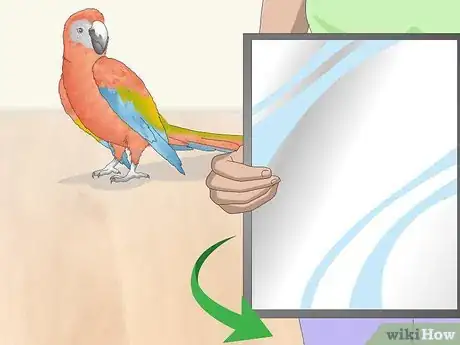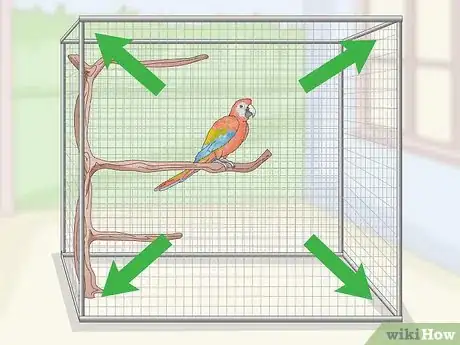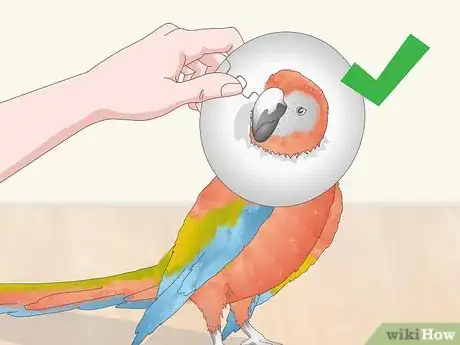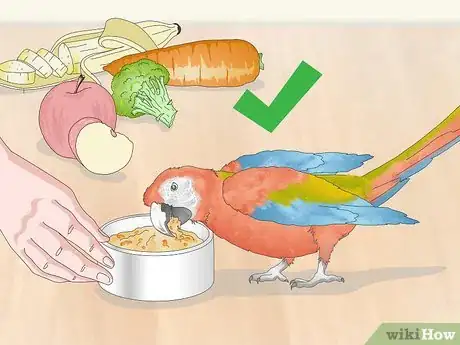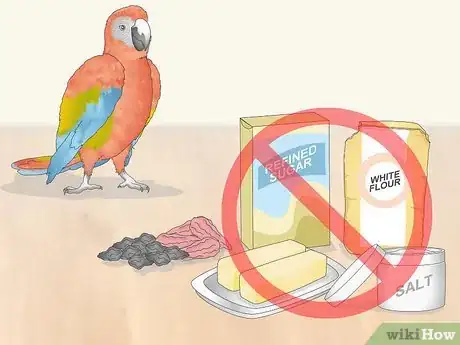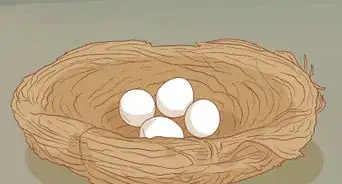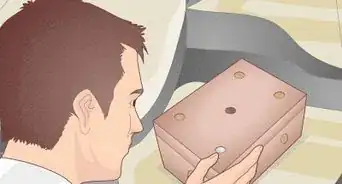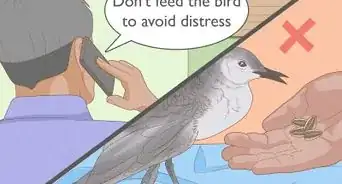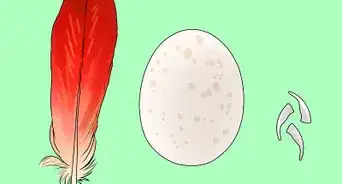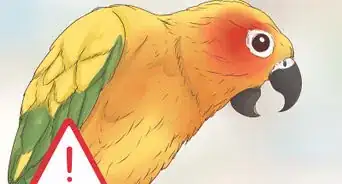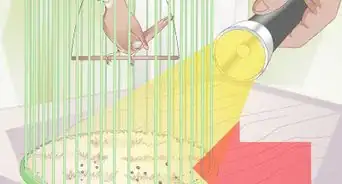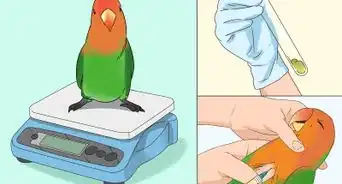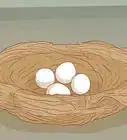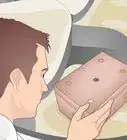This article was co-authored by Pippa Elliott, MRCVS. Dr. Elliott, BVMS, MRCVS is a veterinarian with over 30 years of experience in veterinary surgery and companion animal practice. She graduated from the University of Glasgow in 1987 with a degree in veterinary medicine and surgery. She has worked at the same animal clinic in her hometown for over 20 years.
This article has been viewed 24,715 times.
Feather picking or chewing can be caused by a variety of underlying medical and psychological factors. If your macaw’s skin is itchy, it may try to soothe the itch by picking or chewing its feathers. Similarly, disease or injury may inspire your macaw to soothe itself by feather picking. Boredom, anxiety, stress, and sexual frustration can also lead to this behavior. Make sure you address any related medical conditions and dietary deficiencies, as well as your macaw’s overall psychological well-being.
Steps
Addressing Underlying Medical Causes
-
1Get a complete physical examination. Take your macaw to an avian veterinarian for a complete physical checkup. Get blood tests done and test for hypothyroidism, psittacine beak, and feather disease. Ask the vet to analyze a dropping sample to test for intestinal parasites, like giardia. Although feather picking is often the result of psychological distress, it’s important to rule out any underlying health conditions.
-
2Check for skin irritants and lesions. Your macaw’s feather picking or chewing behavior could be caused by itchy or sore skin. Itchy skin could be the result of mites, bacterial infections, or a fungus. Ask your veterinarian to examine your macaw for possible causes of itchy skin, such as the bacterial infection Staphylococcus or a fungus-like Mucor.
- If your macaw has a mite infection, it will have dandruff on its feathers.
- Your veterinarian may take a damaged feather and examine it for mites.
Advertisement -
3See if your macaw is trying to soothe a disease or injury. If the feather picking looks like an attempt to heal or soothe an injured or diseased part of its body, ask your veterinarian to examine it for internal diseases. Feather picking could be a way of coping with illness.
- Liver disease, giardia, chlamydophila infection, and even fractures have been associated with feather picking and chewing.
Tackling Psychological Factors
-
1Assess psychological reasons for feather picking. Psychological factors such as anxiety, sexual frustration, and boredom may be causing your macaw to pick at its feathers. If the feather picking doesn’t appear to have a medical cause, observe your bird to see whether it may be experiencing psychological distress.
- Separation anxiety is a frequent cause of feather picking in parrots. Be mindful of how much you travel or otherwise leave your macaw alone.
- Consider whether it has experienced anxiety because of a change in the location of its cage or because of a change in your own routine.
-
2Reduce boredom by playing with your macaw. In the wild, macaws fly together and receive plenty of psychological stimulation from their environment. Try to mimic this experience by offering your macaw plenty of toys and by spending time with it.
- You could try giving your macaw mop heads to play with. Place some mop heads in the cage and see if your macaw will pick at them instead of their feathers.
- Consider whether it has a stimulating environment and toys to play with.
-
3Use anti-depressant medications to reduce anxiety. Since feather picking is often a result of anxiety and distress, anti-depressants can be effective. Although the dosing of anti-depressant medications for feather picking is often difficult to figure out, some drugs have shown promise. Ask your avian veterinarian about appropriate anti-depressants:
- Clomipramine has been effective in up to 70% of birds with feather picking behavior.
- Haloperidol has been used for both feather picking and self-mutilating birds.
-
4Try behavior modification to reduce separation anxiety. If your macaw’s feather picking appears to be related to separation anxiety, get it used to the idea of being alone. Give it toys to play with while you are out of the house, mimic your presence with recordings, and leave it alone for progressively longer periods of time.
- You can start by leaving your bird alone for 10 minutes at a time and then move up in increments of 15 minutes or so each time you leave.
- Create a video recording of yourself on your computer or smartphone and then play it on your television when you leave.
- If your macaw is bored or has separation anxiety, you could try turning on the television while you are out of the room. Remember to turn it off at night so it gets plenty of sleep.
-
5Reduce sexual stimulation. Feather picking can be a symptom of sexual frustration in parrots. Reduce sexual stimulation by taking any mirrors out of the cage or room, as well as by not petting your macaw. If such environmental changes don’t work, ask your veterinarian about hormonal therapy with the drug lupron.[1]
- Whereas wild macaws have the opportunity to mate at almost any time of day and often pair up with long-term partners, pet macaws typically have little opportunity to mate.
- Remember to offer your macaw lots of opportunities for non-sexual activity, such as playing with toys and watching television.[2]
Changing their Everyday Habits
-
1Increase the cage size to reduce boredom. Since your macaw’s feather picking and chewing could be caused by boredom, give it a bigger cage. With more space and perhaps a few more places to perch and play, your macaw may find some entertainment beyond feather picking.
- The minimum cage size for a small macaw is 34’’ wide by 36’’ tall and 24’’ deep. The bar spacing should be ¾’’ to 1’’.[3]
- For a large macaw, the minimum size is 36’’ wide, 48’’ deep and 60’’ tall. The bar spacing should be 1’’ to 1.5’’.
- Choose a sturdy cage, since macaws are one of the stronger birds.
-
2Use a vest or collar to block feather picking. If the feather picking is quite severe, put an Elizabethan collar or a vest on your parrot. Keep the vest or collar on them until you have finished behavioral modification techniques.
- A collar should only be used as a last resort. It will keep your macaw from picking at itself, but won't actually stop the itch, making your macaw uncomfortable and frustrated.
- A vest is a great option because your macaw will still be able to eat with the vest on, but won’t be able to pick at its chest.
- A vest can be used to cover a macaw’s chest. You can use an old cloth baby diaper.[4]
-
3Serve a healthy daily diet. Feed your macaw organic whole grains, which should be soaked for 24 hours and then cooked. You could give them amaranth, quinoa, and millet. Serve whole legumes, which should be soaked for ten to twenty-four hours and then cooked. Fresh fruits and vegetables should also be included, such as fennel, mustard greens, broccoli, radish, beetroot, okra, apple, mango, and papaya.
- Pellets can also be included in their daily diet.
- In addition, alfalfa, kelp, and small amounts of ginger and garlic can be added to their diet.
-
4Avoid certain foods to keep from triggering a reaction. Never give your macaw refined sugar, white flour, dairy, salt, fried foods, dried fruit with sulphur dioxide, preservatives, dyes, or foods with artificial flavoring.[5] In addition, you should avoid serving nightshades, such as potatoes and tomatoes. Some grains should be avoided, including:[6]
- Rye.
- Barley.
- Oats.
- Wheat.
- Spelt.
- Kamut.
- Food allergies may also be a problem for your parrot. Soy, corn, peanuts, rice, and wheat are common food allergens.
References
- ↑ https://www.beautyofbirds.com/featherplucking.html
- ↑ https://positively.com/contributors/the-sexually-frustrated-parrot-a-man-made-phenomenon/
- ↑ http://www.bird-cage.com/macaw-cages
- ↑ http://www.petparrot.com/ParrotCarePlucking.htm
- ↑ https://www.beautyofbirds.com/featherpickingdiet.html
- ↑ https://www.beautyofbirds.com/featherpickingdiet.html
About This Article
If your macaw is chewing or picking at its feathers, take it to the vet to find out if there’s an underlying physical cause. For example, the vet may test your bird for hypothyroidism, beak and feather disease, or some other illness or injury that might cause the behavior. Additionally, ask your vet to look for signs of skin irritation, which could be caused by mites or a skin infection. If your vet rules out a physical cause, look for psychological factors. For instance, your macaw may be bored, anxious, or stressed out by something in its environment. Keep reading for more advice from our Veterinarian co-author, including how to help stop feather picking behaviors.
